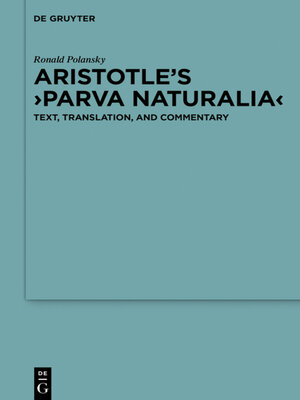
Sign up to save your library
With an OverDrive account, you can save your favorite libraries for at-a-glance information about availability. Find out more about OverDrive accounts.
Find this title in Libby, the library reading app by OverDrive.



Search for a digital library with this title
Title found at these libraries:
| Loading... |
Aristotle's Parva naturalia continues the investigation begun in the De anima. The De anima defines the soul and treats its main powers, nutrition, sense perception, intellection, and locomotion. The Parva naturalia — On sense and sensible objects, On memory and recollection, On sleep, On dreams, On divination in sleep, On motion of animals (De motu animalium ), On length and shortness of life, and On youth and old age and respiration — attends more to bodily involvement with soul. While each work offers fascinating and challenging insights, there has never been as extensive a commentary covering them together. A reason is that the works have often been viewed as incidental and even inconsistent. The De motu animalium has not typically been included, when viewed as an isolated work on animal locomotion.
This commentary argues that the treatises, considered together and with the De motu among them, display a tight sequence manifesting an artful, yet easily overlooked, design. We reveal many techniques of Aristotle's writing that have received little consideration previously. Our commentary contributes to a unified and comprehensive account of Aristotle's overall project regarding the soul and its connections with the body.






